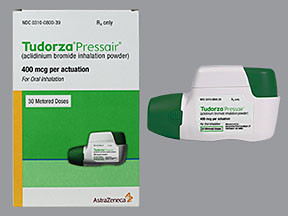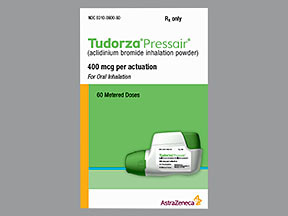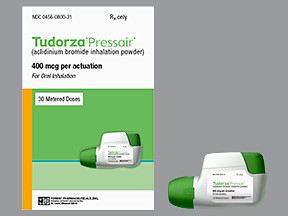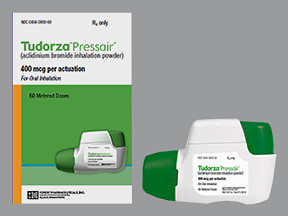ACLIDINIUM POWDER INHALER - ORAL
PHONETIC PRONUNCIATION: (A-kli-DIN-ee-um)
COMMON BRAND NAME(S): Tudorza
GENERIC NAME(S): aclidinium bromide
Uses
USES: Aclidinium is used to control and prevent symptoms (such as wheezing, shortness of breath) caused by ongoing lung disease (chronic obstructive pulmonary disease-COPD which includes bronchitis and emphysema). It works by relaxing the muscles around the airways so that they open up and you can breathe more easily. Aclidinium belongs to a class of drugs known as anticholinergics. Controlling symptoms of breathing problems can decrease time lost from work or school. This medication must be used regularly to be effective. It does not work right away and should not be used to relieve sudden breathing problems. If wheezing or sudden shortness of breath occurs, use your quick-relief inhaler (such as albuterol, also called salbutamol in some countries) as prescribed.
How to use ACLIDINIUM POWDER INHALER - ORAL
HOW TO USE: Read the Patient Information Leaflet and instruction sheet if available from your pharmacist before you start using aclidinium and each time you get a refill. Learn how to use this inhaler properly. If you have any questions, ask your doctor or pharmacist. Inhale this medication by mouth as directed by your doctor, usually twice daily (every 12 hours). Do not breathe out into the mouthpiece at any time. Avoid getting this medication into your eyes. It may cause eye irritation and temporary blurred vision. If you are using other inhalers at the same time, wait at least 1 minute between the use of each medication. Use this medication regularly to get the most benefit from it. This medication works best if used at evenly spaced intervals. To help you remember, use it at the same times each day. Do not increase your dose, use this medication more often, or stop using it without first consulting your doctor. Learn which of your inhalers you should use every day and which you should use if your breathing suddenly worsens (quick-relief drugs). Ask your doctor ahead of time what you should do if you have new or worsening cough or shortness of breath, wheezing, increased sputum, waking up at night with trouble breathing, if you use your quick-relief inhaler more often, or if your quick-relief inhaler does not seem to be working well. Learn when you can treat sudden breathing problems by yourself and when you must get medical help right away. Tell your doctor if your symptoms do not improve or if they worsen.
Side Effects
Precautions
Interactions
Overdose
Images
Reviews
Faq for ACLIDINIUM POWDER INHALER - ORAL
Aclidinium Powder Inhaler is a medication used to treat chronic obstructive pulmonary disease (COPD). It belongs to a class of drugs called anticholinergics, which work by relaxing the muscles in the airways to improve breathing.
To use Aclidinium Powder Inhaler, breathe out fully, place the inhaler mouthpiece between your lips, and inhale deeply and steadily. Hold your breath for a few seconds before exhaling. It is important to follow the specific instructions provided by your healthcare provider.
Common side effects of Aclidinium Powder Inhaler may include headache, cough, dry mouth, and constipation. If you experience any severe side effects or allergic reactions, seek medical attention immediately.
Before using Aclidinium Powder Inhaler, inform your doctor about any allergies, medical conditions, or current medications you are taking. It is important to let your healthcare provider know if you have glaucoma, urinary retention, or a history of heart problems.
It is recommended to inform your doctor if you are pregnant or planning to become pregnant before using Aclidinium Powder Inhaler. It is still unclear whether the medication can pass into breast milk, so consult with your healthcare provider regarding its use during breastfeeding.
Aclidinium Powder Inhaler starts working within a few minutes of inhalation. However, it may take several weeks of regular use for the full benefits of the medication to be felt.
Aclidinium Powder Inhaler is not indicated for use in children or adolescents below 18 years of age. It is important to consult with a pediatrician for appropriate treatment options for children with respiratory conditions.
If you miss a dose of Aclidinium Powder Inhaler, skip the missed dose and continue with your regular dosing schedule. Do not take a double dose to make up for a missed one.
Aclidinium Powder Inhaler may interact with certain medications, including other anticholinergic drugs, so it is important to inform your doctor about all the medications you are taking. This includes prescription, over-the-counter drugs, and herbal supplements.
Disclaimer
IMPORTANT: HOW TO USE THIS INFORMATION: This is a summary and does NOT have all possible information about this product. This information does not assure that this product is safe, effective, or appropriate for you. This information is not individual medical advice and does not substitute for the advice of your health care professional. Always ask your health care professional for complete information about this product and your specific health needs.




No Reviews Yet